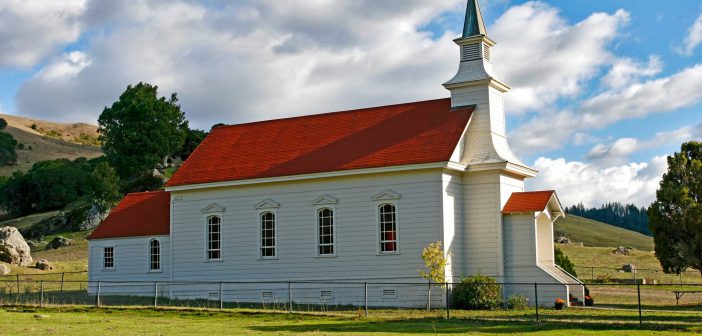Although the Bible commands singing to the Lord, public health officials say it’s an activity that spreads COVID-19, leaving churches in conflict with government limits on public gatherings. Several California pastors have filed lawsuits for what they see as intrusions on the free exercise of religion, but federal courts aren’t taking any chances.
A federal appellate court even thwarted a recent U.S. Supreme Court decision in the name of curbing coronavirus infections and hospitalizations.
The Ninth Circuit Court of Appeals became a thorn in the side of Harvest Rock Church and Harvest International Ministry in Pasadena when it ruled against allowing worshipers to return to church even though SCOTUS had lifted COVID-19 prohibitions in Roman Catholic Diocese of Brooklyn and Agudath Israel of America v Governor Andrew M. Cuomo.
“I’m disappointed,” said Matthew Staver, attorney for Harvest Rock Church. “The decision to uphold a total ban makes no sense. We’re back at the U.S. Supreme Court, and I think we’ll get a much better ruling at the high court, which will ultimately stop this unconstitutional restriction across the state of California.”
The ban Mr. Staver is referring to is under California’s Blueprint for a Safer Economy.
“We argue that California has the most severe restrictions in the entire country and Roman Catholic Diocese and Agudath Israel v Gov. Cuomo requires striking down the restriction,” Mr. Staver told PacerMonitor News. “The court didn’t do it. That’s the main argument.”
Harvest Rock Church isn’t the only California house of worship grappling in federal court with the ban on indoor services.
Calvary Chapel San Jose, for example, sued Santa Clara County in the Northern District of California, seeking damages for violations of constitutional rights and religious liberties over an ordinance, which allows the county to fine the church $5,000 per violation. Pastor Mike McClure has been fined more than $1 million.
“The argument is that it’s cruel and unusual punishment because the church is fined each time they violate an ordinance even if there’s no actual evidence of harm, which is what makes it very unusual,” said attorney Mariah Gondiero, who represents the church.
Pastor McClure faces contempt of court charges before Santa Clara County Superior Court if he continues leading church services, which tends to draw some 800 members each Sunday, according to Ms. Gondiero.
“It’s an attempt to skirt around Roman Catholic Diocese and Agudath Israel v Gov. Cuomo, which is what we see a lot sometimes with lower court opinions,” Ms. Gondiero told PacerMonitor News. “For many judges, they are giving a lot more deference to the science.”
In Roman Catholic Diocese and Agudath Israel v Gov. Cuomo, SCOTUS ruled against color coded restrictions of no more than 10 worshippers permitted in red zones and no more than 25 in orange zones.
“It is time – past time – to make plain that, while the pandemic poses many grave challenges, there is no world in which the Constitution tolerates color-coded executive edicts that reopen liquor stores and bike shops but shutter churches, synagogues, and mosques,” wrote Associate Justice Neil Gorsuch in the SCOTUS opinion.
The state of California has been one of the hardest hit by COVID-19. As of Feb. 1, California had 3,243,348 confirmed coronavirus cases, resulting in 40,697 deaths, according to the state’s COVID-19 dashboard.
“They’re arguing that churches ought to be closed even though all these other places are open,” Mr. Staver said. “They argue that churches are more risky, but they really don’t have any evidence to that effect and none of our churches have had any outbreaks.”
Complicating matters for both Calvary Church San Jose and Pasadena’s Harvest Rock Church is the conflicting ruling that San Diego’s South Bay United Pentecostal Church received from the Ninth Circuit Court of Appeals last month.
“The decision allows people to go to church and worship, but there is not a numerical limit anymore,” Mr. Staver added. “There’s a percentage limit but we don’t really know what that percentage cap is because the court never spelled it out. It helps in the sense that it’s not a total ban on Tiers 2 and 3 but most of our churches are in Tier 1.”
Filed in California Southern District Court, South Bay United Pentecostal Church et al v. Gov. Newsom alleges in its complaint that state officials have intentionally denigrated California churches, pastors and people of faith by relegating them to third class citizenship.
“Defendants have no compelling justification for their discriminatory treatment of churches, pastors and people of faith, nor have they attempted in any way to tailor their regulations to the least restrictive means necessary to meet any arguable compelling interest,” wrote Attorney Charles S. LiMandri in South Bay United Pentecostal’s complaint.
However, on Jan. 25, a Ninth Circuit three-justice panel decided that the risk of contracting COVID-19 belongs not to an individual parishioner but rather a collective.
“The risk is also to the lives of others with whom an asymptomatic person may come into close contact, to the healthcare workers who must care for the person one infects, and to California’s overwhelmed healthcare system as a whole,” wrote Judge Wardlaw in the opinion. “South Bay’s self-serving assertion that it has experienced no incidence of the virus among its worshipers is entirely anecdotal and undermined by evidence of outbreaks in similarly situated places of worship.”
All three federal cases may soon be resolved depending on how SCOTUS rules. Mr. Staver filed a final reply brief on Jan. 29 regarding Harvest Rock Church, while SCOTUS Associate Justice Elena Kagan ordered California Gov. Newsom to respond.






